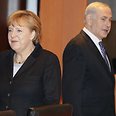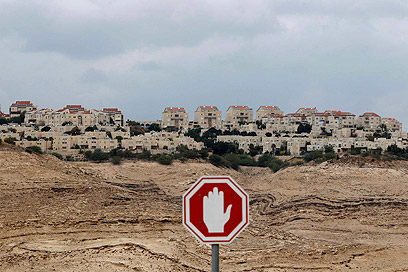

The European Union warned Israel of unspecified consequences Monday if it goes through with plans to build thousands of new settler homes in Jerusalem and the West Bank.
The bloc's 27 foreign ministers said they were "deeply dismayed" by Israeli plans to expand settlements in east Jerusalem and particularly the E1 project, which would separate the West Bank from east Jerusalem, the Palestinians' hoped-for capital, and drive a big wedge between the northern and southern flanks of the West Bank.
Related stories:
- EU foreign ministers meet on E1 plans
- Britain says EU not looking at Israel sanctions
- EU receives Nobel Peace Prize
"The European Union is deeply dismayed by and strongly opposes Israeli plans to expand settlements in the West Bank," said the ministers said in a joint statement released at the conclusion of a one-day meeting in Brussels.
The plan "would seriously undermine the prospects of a negotiated resolution of the conflict" since it would question the viability of the two states that are expected to emerge from the peace process, it said.

Ma'ale Adumim settlement (Photo: Reuters)
On the day it was awarded the Nobel Peace Prize, the EU "reiterates that settlements are illegal under international law and constitute an obstacle to peace," it added.
The statement said that in view of recent developments, which include an unprecedented UN upgrade of the Palestinians' diplomatic status, the EU believed it was now time to take "bold and concrete steps towards peace."
To this end, both sides must "engage in direct and substantial negotiations without pre-conditions in order to achieve a lasting solution to the Israeli-Palestinian conflict, ending all claims."
The EU also called on the Palestinian leadership to use the UN upgrade constructively and not take steps which would "deepen the lack of trust and lead further away from a negotiated solution."
'Global critcism – double standard'
Israel's Foreign Ministry dismissed the resolution, stating that EU's focus on the issue was "mistaken."
“Facts and history both prove that Jewish settlement never constituted an obstacle to peace,” said Israeli Foreign Ministry spokesman Yigal Palmor. “Therefore, the EU’s focus on this issue is mistaken.”
The ministry further claimed that the EU's "one-sided position" rewards the Palestinians' refusal to engage in peace talks.
Earlier Monday, Prime Minister Benjamin Netanyahu decried global criticism of the settlement construction plan as a double standard.
“We cannot accept that when Jews build homes in their ancient capital, Jerusalem, the international community has no problem finding its voice, but when Palestinian leaders openly call for the destruction of Israel, the one and only Jewish state, the world is silent,” Netanyahu said.
PA seeks to resume talks
Meanwhile, Palestinian negotiator Saeb Erakat said Monday that the Palestinians were looking to reactivate peace talks with Israel with the aim of resolving all final status issues within six months.
Erakat told the official Voice of Palestine radio that the UN vote meant "a new stage" had been reached, convincing the Arab world that the peace process could be reconsidered.
Direct peace talks that began in September 2010 collapsed quickly in a dispute over settlements, with the Palestinians calling for a construction freeze and Israel arguing for a return to talks without such preconditions.
Before the start of talks in 2010, Israel observed a 10-month freeze on new West Bank construction but has refused repeated requests to renew it, dismissing them as an unacceptable "precondition" for talks.
The Palestinians say it is an "obligation" under international law.
AP and AFP contributed to the report
- Receive Ynetnews updates
directly to your desktop















